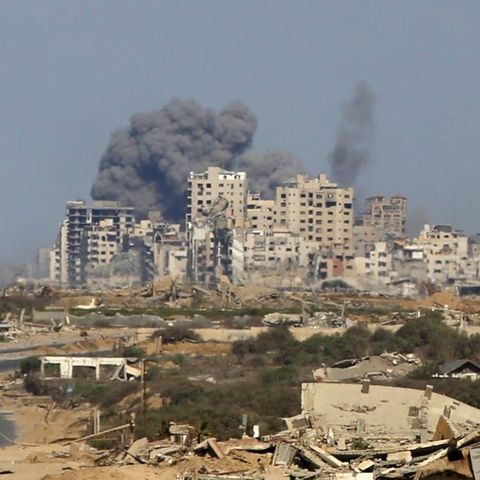Nationwide protests by the Last Generation group paralyze traffic in numerous large cities in Germany at important points – there were also injuries.
Climate activists of the last generation have blocked traffic in several German cities at important points. In cities like Berlin, Leipzig, Dresden and Braunschweig, protesters glued themselves to the road on Friday – some wore masks showing Chancellor Olaf Scholz (SPD), Transport Minister Volker Wissing (FDP) and Economics Minister Robert Habeck (Greens). They held up banners that read, “We’re breaking the law.”
According to the group, the reason for the protest was the “breach of the climate protection law by the government”. The activists accuse Wissing of not having submitted an immediate program to comply with the maximum amounts of climate-damaging greenhouse gases specified in the Climate Protection Act, despite a legal obligation.
According to the latest generation, at least 36 sit-ins were planned in 26 cities throughout Germany. “The federal government is breaking the law and leading our society to collapse,” said the group’s spokeswoman, Carla Rochel. “It is our democratic duty to resist peacefully.”
One injured in a rear-end collision
A motorist was injured in a traffic jam as a result of a blockade of Autobahn 73 in Nuremberg. According to the police, the 31-year-old saw the trailer of a truck too late in a traffic jam and was trapped with his vehicle under the trailer. The police were initially unable to provide any information on the severity of the injuries.
An 18-year-old activist from the Last Generation group is said to have been slightly injured in a road blockade in Bottrop in the morning. According to her own statements, she suffered the injury when a woman pulled her off the road by her hair, a police spokeswoman said. A video distributed on Twitter shows a corresponding scene.
According to the police, a complaint is pending against unknown persons for bodily harm in connection with the activist’s injury. According to the police, there was no sticking action in the first place. Traffic was significantly affected for a short time, but soon ran again.
Eight activists paralyzed traffic in downtown Munich for about two hours in the morning. Activists blocked traffic in Nuremberg in three places. The police broke up the blockades with some activists glued to the street after about 30 minutes, a spokesman said. The activists are now being investigated for coercion and for violating the general decree of the city of Nuremberg, according to which unannounced sticking actions by climate activists were prohibited.
Hotspot Victory Column
In Berlin, among other things, more than a dozen activists protested at the roundabout around the Victory Column, as a dpa reporter observed. Several people glued themselves to the road there. According to the dpa reporter, numerous drivers tried to avoid the blockade by driving on the sidewalks. After a good hour, traffic at the Victory Column was back to normal.
There was also a sticking action on a street in downtown Potsdam. This is also the case in Dresden and Leipzig – both sit-ins were ended by the police.
In Braunschweig, activists blocked a street in the city center during rush hour. There was criticism of this from the Lower Saxony state government. “According to the Prime Minister, this is harmful to climate protection,” said a spokeswoman for Stephan Weil (SPD). Climate protection is a major task for society as a whole. “If you then antagonize large parts of society, that doesn’t help the cause.”
Airports recently paralyzed
On Thursday, activists paralyzed the airports in Hamburg and Düsseldorf for several hours by overcoming the fences, running onto the runways and sticking themselves near the runways. In Hamburg, air traffic was completely suspended for a few hours on the first day of vacation. Several flights were diverted or delayed in Düsseldorf.
Transport Minister Wissing sharply condemned the blockades at the airports. “The whole thing is an impertinence for the entire population, completely unacceptable and must be punished with all severity,” said the FDP politician to the “Rheinische Post”.
After the adhesive action at Düsseldorf Airport, the airport boss defended the security concept for the area – but considered possible improvements. The fence around the site meets “all legal security requirements according to the high German and European requirements,” said airport managing director Lars Redeligx of the Düsseldorf “Rheinische Post”.
According to Redeligx, the first emergency services were on site just four minutes after the alarm was received by the airport’s traffic control center. This prevented the activists from being able to spread out over a large area. “The fact that only some of the activists were ultimately only able to stick to one spot is also a result of this short reaction time.”
The last generation wants to reduce their blockades in the next three weeks. They now want to use three weeks’ time “to integrate new people who have come along,” said a spokesman for the dpa group. “We want to gather strength for the upcoming protests in August and September.”
Source: Stern
I have been working in the news industry for over 6 years, first as a reporter and now as an editor. I have covered politics extensively, and my work has appeared in major newspapers and online news outlets around the world. In addition to my writing, I also contribute regularly to 24 Hours World.




